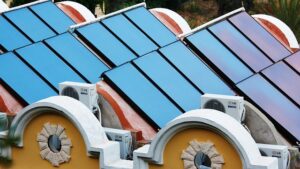Water heaters electric systems face corrosion and scale buildup challenges. Stainless steel is ideal due to superior resistance, extending lifespan and efficiency. Tankless electric systems prevent scale, offering instant hot water. Proper annual cleaning and regular inspections crucial for optimal performance, especially in tank-type models.
“Discover how stainless steel electric water heaters outperform their counterparts in resisting corrosion and scale buildup. This comprehensive guide explores the intricate balance between these factors, impacting your heater’s longevity and performance. From understanding the science behind corrosion and scale formation to leveraging the unique properties of stainless steel, we provide effective strategies for maintenance and prevention. Learn essential tips to ensure your electric water heater remains efficient and free from damaging deposits.”
- Understanding Corrosion and Scale Formation in Water Heaters
- The Role of Stainless Steel in Preventing Corrosion
- Effective Measures to Combat Scale Buildup
- Maintenance Tips for Longevity and Performance
Understanding Corrosion and Scale Formation in Water Heaters

Corrosion and scale buildup are common challenges faced by various types of water heaters, including electric models. Electric water heating systems operate by passing electrical current through heating elements immersed in water, converting electrical energy into thermal energy to heat the liquid. Over time, this process can lead to the accumulation of minerals and contaminants present in tap water, resulting in scale formation on the heater’s internal components. Scale is a hard, calcified substance that not only reduces the efficiency of the water heater but also poses significant structural integrity issues.
Scale buildup accelerates corrosion, as metal surfaces come into contact with these mineral deposits. Corrosion weakens the metal, leading to potential leaks and failure of critical parts. In residential electric heaters, tankless electric systems, point-of-use heaters, or even electric storage heaters, understanding this process is crucial for maintaining optimal performance and longevity. Energy-efficient home water heating often relies on efficient electrical systems, so addressing corrosion and scale is essential to ensure continuous, reliable hot water supply.
The Role of Stainless Steel in Preventing Corrosion

Stainless steel plays a pivotal role in preventing corrosion and scale buildup in electric water heaters. Its inherent properties make it an excellent choice for water heating applications, offering superior resistance to both chemical and electrochemical corrosion compared to other metals. This is particularly crucial in electric water heaters, where the presence of electricity can accelerate corrosion rates.
The use of stainless steel in residential electric heaters, tank water heaters, and even tankless electric systems (like point of use heaters and instant electric heaters) ensures longer lifespan and better performance. Its resistance to scaling and corrosion translates to reduced maintenance requirements and energy-efficient hot water systems. Home water heating is made more efficient with stainless steel, contributing to cost savings over time for homeowners, making it a popular choice in the market for electric hot water systems.
Effective Measures to Combat Scale Buildup

Maintaining clean and reliable hot water is essential for any household or business relying on electric water heaters. Scale buildup, a common issue with tank-type electric water heaters, can reduce efficiency and even lead to costly repairs. Effective measures to combat this include regular cleaning and maintenance. Many modern residential electric heaters come equipped with advanced features like self-cleaning mechanisms and scale-reducing coatings, ensuring longer lifespan and consistent performance.
For traditional tank water heaters or those seeking energy-efficient heating solutions, switching to tankless electric systems can be a game-changer. These point-of-use heaters eliminate the need for a storage tank, reducing scale buildup and offering instant hot water. Instant electric heaters are particularly popular in homes and businesses aiming for both comfort and cost savings, as they provide efficient, reliable, and continuous hot water without the hassle of mineral accumulation.
Maintenance Tips for Longevity and Performance

Proper maintenance is key to ensuring your stainless steel electric water heaters perform optimally and resist corrosion for years. Regular cleaning, typically once a year or as recommended by the manufacturer, helps remove any mineral deposits or scale buildup inside the tank. This process involves flushing out the heater and using specialized chemicals to dissolve and prevent future accumulation.
Additionally, checking and replacing the insulation and gaskets periodically is crucial, especially in residential electric heaters. Tankless electric systems, like point of use heaters and instant electric heaters, require less maintenance due to their absence of a storage tank, but regular inspections for any signs of damage or leaks are still essential for energy-efficient home water heating.
Stainless steel electric water heaters offer a reliable and durable solution, thanks to their inherent resistance to corrosion and scale buildup. By understanding the factors that contribute to these issues and implementing effective maintenance practices, homeowners can ensure optimal performance and longevity from their stainless steel electric water heaters. Regular cleaning, proper water treatment, and timely replacement of parts are key strategies to keep your water heater in top shape, providing you with hot water efficiently for years to come.






